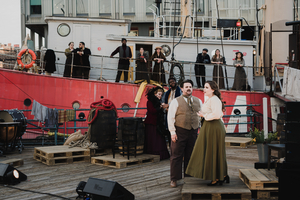Review: On Site Opera's TABARRO Brings Noir Puccini to New York's South Street Seaport
The Composer’s Economy of Writing Pays Off with this Pithy, Site-Specific Production

Seaport Museum's ship, the Ambrose. Photo: Dan Wright
IL TABARRO has a special relationship to New York, since it's the only Puccini to premiere here at the Metropolitan, in 1918.
It's the first third of the trio of short operas that go by the title IL TRITTICO (the others being GIANNI SCHICCHI and SUOR ANGELICA)--but no one attending the other night's performance by On Site Opera in partnership with the South Street Seaport Museum should have felt short-changed. It definitely felt like an evening's worth of opera, and a fine one at that.
This is the third Puccini I've seen recently that was done in a nontraditional style or setting, but the first to play it "straight"--no cuts, no rethinking, no updating--nothing but simply the opera that the composer and his librettist, Giuseppe Adami, premiered. Though it's performed outdoors on a ship rather than a barge (the setting specified)--the Ambrose, moored at South Street Seaport's Pier 16, where the audience was seated--I don't consider that significant tampering with the original.
The result: On Site Opera's production, which lasted a mere hour or so, was a thoughtful, entertaining and spirited foray into the work. It had a fine cast directed by Laine Rettmer and orchestra, under Geoffrey McDonald, providing the moody atmosphere the composer was seeking. The setting, with the action taking place on the ship and pier, gave an authenticity to the one-acter, particularly when the cast was so much in tune with it; the score even has a couple of standout arias--impressive in such a short piece--including Giorgetta's "È ben altro il mio sogno!" and Luigi's "Hai ben ragione! meglio non pensare."
Soprano Ashley Milanese was an earthy, animated Giorgetta, the object of affection of both her husband, Michele (baritone Eric McKeever) and one of the ship's stevedores, Luigi (tenor Yi Li). She soared in Puccini's gritty score and made it clear why the two men lusted after her. As her husband, baritone McKeever prowled the ship in search of revenge like a caged animal, in a role that was coarsely drawn but which he gave a rich texture. Tenor Li's Luigi was a smooth foil both as love interest for Giorgetta and victim for her husband.
Also notable were another stevedore, Tinca, sung surely by tenor Jose Heredia; mezzo Sharmay Musacchio's Frugola, "the rummager," who dreamed of leaving for the country; and a last-minute substitution, tenor Daniel Rosenberg, fine as the Song Seller.
The production's costumes were by Howard Tsvi Kaplan, lighting by Shawn K. Kaufman, intimacy direction by Katherine M. Caerter and fight direction by Jason Paul Tate.
While the acoustics may have been somewhat of an issue in the way some of the music came through, the heartfelt performances by cast and orchestra made the evening a success. This tale of illicit love, a marriage in pieces and murder, was exciting to watch, particularly on a lovely evening as the natural light faded.
The opera's final performance of its short run is tonight, May 17. For more information, including future events, see On Site Opera's website.
Reader Reviews

Videos
